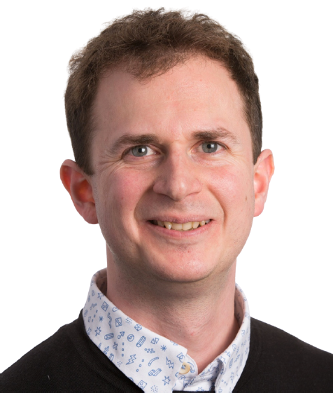 Senior Research Fellow – Sir Charles Hercus Health Research Fellow
Senior Research Fellow – Sir Charles Hercus Health Research Fellow
BSc(Hons, First Class), PhD
Appointed: 2015
Current research
The overall aim of my research group is to understand the interactions between bacterial viruses (phages) and their hosts.
Currently, we are funded to study bacterial phage defence systems, such as CRISPR-Cas adaptive immune systems. With the rise of antimicrobial resistance (AMR) in bacterial pathogens, we urgently need to find new ways to treat bacterial infections. Exploiting phages as natural antimicrobials to kill bacterial pathogens, termed phage therapy, is a promising approach to address the AMR crisis. However, the success of phage therapy is dependent on understanding the complex interaction between phages and bacteria. To address these challenges, we use a combination of bioinformatic, comparative genomics and molecular biology approaches.
In 2017, I was awarded the IlluminaTM Emerging Researcher Award, as the top New Zealand Molecular Biologist within 5 years of PhD completion.
Areas of current research focus
- Understanding how bacteria update their CRISPR-Cas adaptive immune systems, termed CRISPR adaptation.
- Exploring cooperation between diverse CRISPR-Cas systems to prevent viral escape from immunity.
- Discovery and characterisation of new types of phage defense system encoded by bacteria.
- The relationships between phage defense and symbiosis in Rhizobia.
Applications
- Exploiting phages to enhance legume productivity.
- Developing new types of molecular diagnostics to detect bacterial and viral infections.
- Exploiting phage-encoded enzymes as new antimicrobials.
Maurice Wilkins Centre
Maurice Wilkins Center for Molecular Biodiscovery
Postgraduate student supervision
PhD
- Leighton Payne, current
- Nils Birkholz, 2017–2021
- Leah Smith, 2016–2020
- Hannah Hampton, 2015–2018
MSc
- Stephanie Trickey, current
- Bridget Fellows, 2020
- Nils Birkholz, 2016
- Julian Taffner, 2014
BSc(Hons)
- Thomas Hughes, 2021
- Thomas Ware, 2020
- Leighton Payne, 2019
- Maureen Yin, 2019
- Nick Donaldson, 2018
- Matthew Prouse, 2014
- Lauren Nichol, 2014
- Jack Hervey, 2013
Summer studentships
- Aileen Harwood, 2020–2021
- Leighton Payne, 2019–2020
- Maureen Yin, 2018–2019
- Nick Donaldson, 2017–2018
- Jack Hervey, 2012–2013
Research Funding and Fellowships
- 2020: Deans Bequest ($12,500) as PI. ‘The relationship between nitrogen fixation and bacteriophage resistance in Rhizobium leguminosarum.’
- 2020: Marsden Grant (RSNZ, $960,000) as AI (PI: Professor Peter Fineran). ‘How do bacterial CRISPR-Cas defences protect against nucleus-forming phages?’
- 2020: Health Research Council Project ($1,199,272) as AI (PI: Dr Matthew McNeil). ‘Combating antimicrobial resistance with high throughput bacterial genetics.’
- 2019: University of Otago Research Grant ($37,471) as PI. ‘A new approach to discover phage defence systems in bacteria.’
- 2019: MBIE SmartIdeas ($1,000,000) as a Key Researcher (PI: Professor Peter Fineran). ‘Phage-inspired custom antimicrobials to target bacterial pathogens.’
- 2019: Deans Bequest (University of Otago, $21,000) as PI. ‘New types of phage defences encoded in bacterial genomes.’
- 2019: Maurice Wilkins Centre Flexible Research Grant ($26,000) as an AI (PI: Dr Jeremy Owen, Victoria University of Wellington). ‘Development of new synthetic biological tools for cloning and expression of antibiotic biosynthetic gene clusters from microbial genomes.’
- 2018: Marsden Fast Start Grant (RSNZ), as PI ($300,000) (AI: Professor Antonio Sánchez-Amat, University of Murcia, Spain). ‘Mobile CRISPR-Cas systems and the genesis of hybrid adaptive immunity in bacteria.’
- 2018: EMBO Workshop ‘Viruses of Microbes 2018’ travel grant (€500).
- 2017: Deans Bequest (University of Otago, $16,000) as an AI (PI: Professor Peter Fineran). ‘Chimeric CRISPR-Cas systems – the evolution of new bacterial immunity?’
- 2016: Deans Bequest (University of Otago, $21,648) as an AI (PI: Professor Peter Fineran). ‘You’re 1 in a million: a novel high-throughput methodology for finding key regulators of gene expression in bacteia.’
- 2013: Division of Health Sciences Career Development Postdoctoral Fellowship (~$150,000, University of Otago). ‘Assembly and photoprotection of Photosystem II in Synechocystis sp. PCC 6803.’
Publications
Jackson, S. A., Birkholz, N., Malone, L. M., & Fineran, P. C. (2019). Imprecise spacer acquisition generates CRISPR-Cas immune diversity through primed adaptation. Cell Host & Microbe, 25, 250-260. doi: 10.1016/j.chom.2018.12.014 Journal - Research Article
Malone, L. M., Warring, S. L., Jackson, S. A., Warnecke, C., Gardner, P. P., Gumy, L. F., & Fineran, P. C. (2020). A jumbo phage that forms a nucleus-like structure evades CRISPR-Cas DNA targeting but is vulnerable to type III RNA-based immunity. Nature Microbiology, 5, 48-55. doi: 10.1038/s41564-019-0612-5 Journal - Research Article
Jackson, S. A., & Fineran, P. C. (2019). Bacterial dormancy curbs phage epidemics. Nature, 570, 173-174. doi: 10.1038/d41586-019-01595-8 Journal - Research Other
Birkholz, N., Fagerlund, R. D., Smith, L. M., Jackson, S. A., & Fineran, P. C. (2019). The autoregulator Aca2 mediates anti-CRISPR repression. Nucleic Acids Research, 47(18), 9658-9665. doi: 10.1093/nar/gkz721 Journal - Research Article
Nicholson, T. J., Jackson, S. A., Croft, B. I., Staals, R. H. J., Fineran, P. C., & Brown, C. M. (2019). Bioinformatic evidence of widespread priming in type I and II CRISPR-Cas systems. RNA Biology, 16(4), 566-576. doi: 10.1080/15476286.2018.1509662 Journal - Research Article